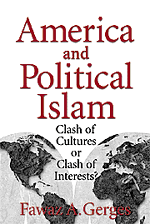Book contents
- Frontmatter
- Contents
- Acknowledgments
- 1 Framing American Foreign Policy
- 2 The Intellectual Context of American Foreign Policy
- 3 Islam and Muslims in the Mind of America
- 4 The Carter, Reagan, and Bush Administrations' Approach to Islamists
- 5 The Clinton Administration: Co-opting Political Islam
- 6 The Islamic Republic of Iran
- 7 Algeria
- 8 Egypt
- 9 Turkey
- 10 Conclusion
- References
- Index
10 - Conclusion
Published online by Cambridge University Press: 05 June 2012
- Frontmatter
- Contents
- Acknowledgments
- 1 Framing American Foreign Policy
- 2 The Intellectual Context of American Foreign Policy
- 3 Islam and Muslims in the Mind of America
- 4 The Carter, Reagan, and Bush Administrations' Approach to Islamists
- 5 The Clinton Administration: Co-opting Political Islam
- 6 The Islamic Republic of Iran
- 7 Algeria
- 8 Egypt
- 9 Turkey
- 10 Conclusion
- References
- Index
Summary
Despite the myriad pronouncements by American officials, the United States does not have a comprehensive, coherent policy regarding the role of Islam in the political process. American thinking on Islamists has not been translated into concrete policy guidelines. Hence Washington's general and abstract statements should be seen as an ideal type, because no serious attempt has been made to operationalize a policy directive on Islamic resurgence.
Three factors account for the absence of a comprehensive American policy toward Islamic activists. First, neither the Bush nor the Clinton administrations – none of their predecessors made any elaborate statement on Islam – had an overarching, encompassing foreign-policy vision. Both administrations briefly flirted with the idea of creating a new world order in America's image. When faced with the requisite costs, however, presidents Bush and Clinton abandoned their ambitious effort in favor of micro, pragmatic, and selective policies.
Clinton, in particular, seems to be much more concerned with “low,” or domestic, politics, and he has essentially delegated foreignpolicy formulation to a select team of aides. “High” politics, including the Middle East and the larger Muslim world, is clearly not Clinton's passion. More than any other recent president, Clinton appears to be overly sensitive to internal ethnic politics, conducting foreign-policy on an ad hoc, short-term basis, often geared to satisfy certain domestic constituencies. The result is that American policy has been mostly reactive to crises as they unfold on the world stage. The U.S. approach to Islamic resurgence is a case in point.
- Type
- Chapter
- Information
- America and Political IslamClash of Cultures or Clash of Interests?, pp. 227 - 242Publisher: Cambridge University PressPrint publication year: 1999

